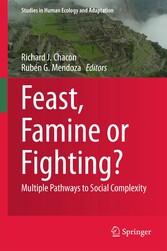Suchen und Finden
Feast, Famine or Fighting? - Multiple Pathways to Social Complexity
The advent of social complexity has been a longstanding debate among social scientists. Existing theories and approaches involving the origins of social complexity include environmental circumscription, population growth, technology transfers, prestige-based and interpersonal-group competition, organized conflict, perennial wartime leadership, wealth finance, opportunistic leadership, climatological change, transport and trade monopolies, resource circumscription, surplus and redistribution, ideological imperialism, and the consideration of individual agency.
However, recent approaches such as the inclusion of bioarchaeological perspectives, prospection methods, systematically-investigated archaeological sites along with emerging technologies are necessarily transforming our understanding of socio-cultural evolutionary processes. In short, many pre-existing ways of explaining the origins and development of social complexity are being reassessed.
Ultimately, the contributors to this edited volume challenge the status quo regarding how and why social complexity arose by providing revolutionary new understandings of social inequality and socio-political evolution.
Richard J. Chacon is an Associate Professor of Anthropology at Winthrop University. He has conducted ethnographic fieldwork in Amazonia among the Yanomamo of Venezuela, the Yora of Peru and the Achuar (Shiwiar) of Ecuador. In the Andes, he has conducted ethnographic fieldwork among the Otavalo and Cotacachi Indians of Highland Ecuador. His research interests include collective action, optimal foraging theory, indigenous subsistence strategies, natural resource conservation, warfare, belief systems, the development of social complexity, ethnohistory, ethics and the effects of globalization on indigenous peoples.
Rubén G. Mendoza is of Yaqui ancestry and is Professor of Social and Behavioral Sciences at California State University, Monterey Bay. He has conducted archaeological investigations in California, Colorado, Arizona, and in Guanajuato and Puebla, Mexico. His research interests include Mesoamerican and South American civilizations, and Hispanic, Native American, and mestizo traditional technologies and material cultures of the US Southwest. He currently serves as the Director for the California State University, Monterey Bay, Institute for Archaeological Science, Technology, and Visualization.
Alle Preise verstehen sich inklusive der gesetzlichen MwSt.







